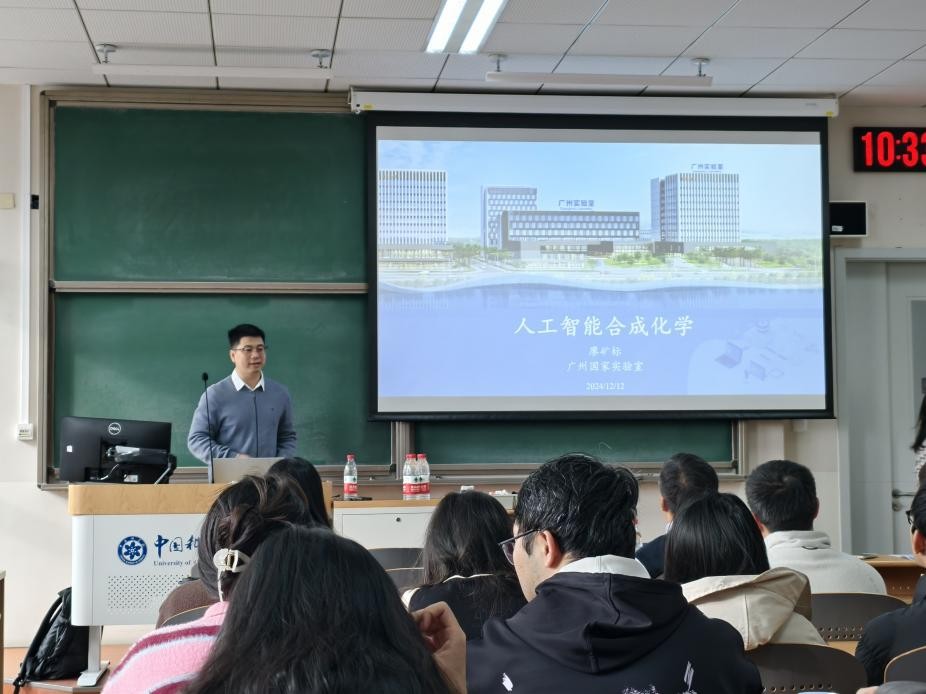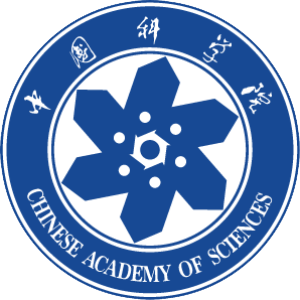On the morning of December 12, 2024, at 10:30 AM, Dr. Liao Kuangbiao, a researcher from the Guangzhou National Laboratory, was invited by Professor Huang Hui to give a lecture on "Artificial Intelligence in Synthetic Chemistry" at the University of Chinese Academy of Sciences. The lecture was held in Room 305 of Teaching Building 1.
Dr. Liao Kuangbiao is a researcher at the Guangzhou National Laboratory, Chief Scientist at AIChemEco, a member of the National Youth Federation, and a standing committee member of the Guangzhou Association for Science and Technology. He has received several prestigious honors, including the Guangdong Youth May Fourth Medal, National High-level Overseas Young Talent, Outstanding Expert in Guangzhou, and the Most Beautiful Scientific Worker in Guangzhou. He graduated with a bachelor's degree from Sun Yat-sen University in 2013 and earned his PhD from Emory University in the United States in 2017. In 2018, he joined AbbVie Pharmaceuticals, and in 2019, he returned to China to work as a researcher at the Bioland Lab, where he was responsible for establishing the chemical synthesis platform. In 2021, he became a researcher at the Guangzhou National Laboratory and founded AIChemEco, where he currently serves as Chief Scientist. His research interest is in AI chemistry. He has long been committed to designing and building the next generation of automated high-throughput synthesis platforms, developing chemical reaction big data systems, advancing AI models for reaction prediction, and creating new organic synthesis methodologies. Up to now, he has published a series of academic papers as the corresponding or first author in top journals such as Nature (2 papers), Nature Chemistry, Chem, and ACIE.

Before the lecture began, Dr. Liao posed an interesting question: "Why did 'AI-driven protein structure prediction' win the Nobel Prize in Chemistry?" This sparked strong interest in AI among the faculty and students. He then provided a detailed overview of the existing challenges in the field of synthetic chemistry, and based on these issues, innovatively proposed the use of AI to assist in chemical research.
The Fourth Industrial Revolution has propelled the development of synthetic chemistry by seamlessly integrating cutting-edge technologies such as automation, data science, and AI. Dr. Liao’s research team has been dedicated to advancing AI chemistry and contributing to the paradigm shift in synthetic chemistry research. The lecture detailed how his team has addressed challenges related to high-throughput automation, standardized data, and AI accessibility. It also discussed how they have evolved from the automation-based synthesis stage to an AI-driven intelligent synthesis stage, applying these innovations in the discovery and optimization of new reactions.

The lecture also introduced a large language model platform for synthetic chemistry called "SynAsk" and provided a detailed comparison of this AI platform with ChatGPT-4o in synthetic chemistry research, demonstrating how SynAsk outperforms ChatGPT in this field. In addition, the lecture showed how SynAsk can be used to effectively predict the chiral ligands and the yield of synthetic reactions, showing the immense potential of AI in synthetic chemistry.

Finally, the lecture provided a thorough introduction to AI model training and dimensionality reduction techniques and gave a forward-looking perspective on the future of AI-driven chemistry, sparking a lively discussion among faculty and students.

